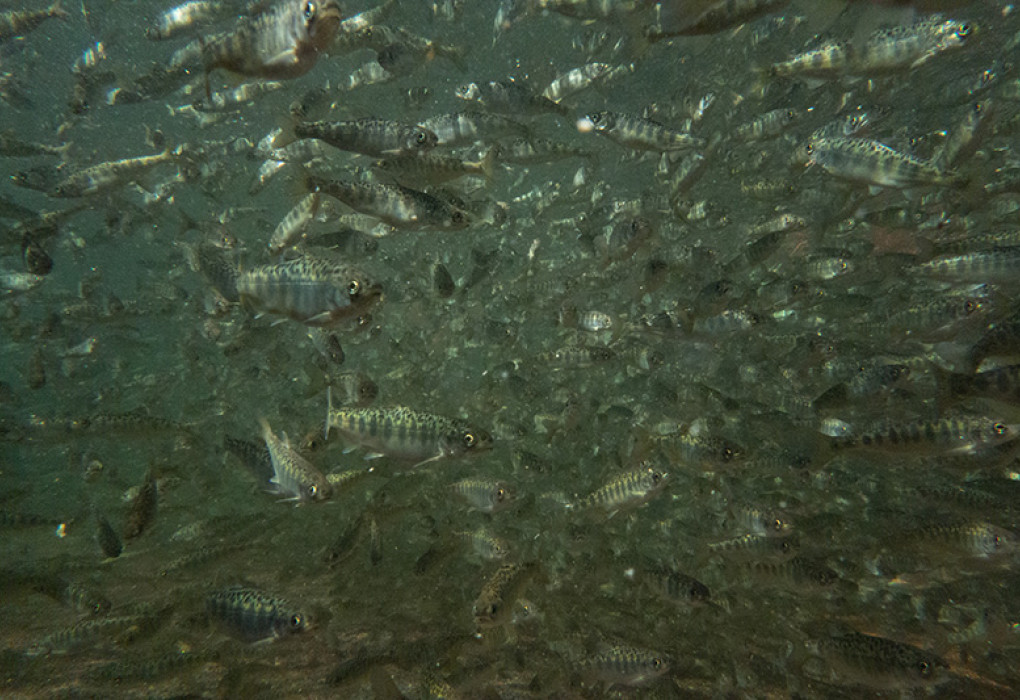What!? $10,000,000 to Rebuild Oregon's Hatchery Infrastructure?
This past week the Joint Committee on Ways and Means SubCommittee on Natural Resources held a hearing on the Governor's recommended 2017-19 Oregon Department of Fish and Wildlife Budget. Of primary concern is the state's continued focus on investments in hatchery infrastructure, while defunding conservation programs that would benefit native fish and watershed health. The Native Fish Society weighed in to provide the committee and Governor Brown with alternatives to their current plan that would serve the interest of all Oregonians and the state's remarkable wild salmon, steelhead and trout.
March 28, 2017
Senator Lew Frederick
Co-Chair, Joint Committee on Ways and Means SubCommittee on Natural Resources
900 Court St. NE, S-419
Salem, OR 97301
Representative Brad Witt
Co-Chair, Joint Committee on Ways and Means SubCommittee on Natural Resources
900 Court St. NE, H-374
Salem, OR 97301
RE: Governor’s Recommended 2017-2019 ODFW Budget
Dear Joint Committee Members,
Thank you for the opportunity to provide comments on the Governor’s recommended 2017-19 ODFW Budget. The Native Fish Society, the leading science-based native fish conservation organization working in the Northwest, with 3,000 members and supporters and 89 volunteer River Stewards, offers the following comments, which we hope will foster a shift in priorities toward wild, native fish in the Oregon Department of Fish and Wildlife’s future investments.
First we offer the following observation: Overall the ODFW’s budget prioritizes increased investment in hatchery propagation and infrastructure, while cutting deeper into ODFW conservation programs that provide benefits to wild, native fish. We find this trend deeply concerning and counter to the ODFW’s Native Fish Conservation Policy which stipulates the agency’s overriding obligation is to prevent the serious depletion of Oregon’s wild, native fish. Furthermore, many of the conservation investments being considered for reductions not only benefit wild, native fish, but also represent the state’s investment in healthy watersheds, which benefit all Oregonians. Until the ODFW’s budget reflects the priorities of the Native Fish Conservation Policy and prioritizes investments that benefit all Oregonians, instead of a subset of anglers interested in harvesting hatchery fish, we’re concerned that the protection and recovery of naturally spawning populations of native fish will not be successful and ODFW will continue to face budget challenges.
We support funding the following:
POP 108 Instream Water for Fish Health: This is an important investment in the program that insures sufficient flows exist in stream for fish. Fully funding this program will help ensure that Oregon’s iconic rivers and streams continue to support their vibrant ecosystems. Clean water with sufficient flows for fish also means that all Oregonians will be able to enjoy their local watersheds.
POP 090 Currently there are reductions slated for fishery research and monitoring – that would reduce ODFW’s salmon monitoring programs by $381,557. We believe this is a significant misstep. Without funding monitoring and research, salmon managers are unable to make management decisions based upon robust scientific information. In the past, a lack of scientific information led to overharvest of salmon populations, declining health, and costly fishery closures.
We also request that funding be provided for fish screening and passage – the current budget proposes a $258,434 reduction that would eliminate tech positions in Central Point and John Day. This reduces the screen shops ability to maintain existing screens and take on new fish screening project. Fish screening and fish passage are two ways that ODFW work with Oregon’s water users to ensure we don’t cause undo harm to wild, native fish.
POP 90 also calls for proportional services and supplies reductions from General Fund in the following areas that benefit native fish: regional management, fish management, statewide policy and coordination, plan implementation and technical support, monitoring and evaluation, and water quality / quantity programs. Defunding these items, impairs the agency’s ability to follow through on its mission. Oregonians who volunteered their time serving on stakeholder groups during various Conservation Planning processes, deserve to see the hard won provisions for wild, native fish implemented on the ground. For example, three years after the completion of the Coastal Conservation and Management Plan the ODFW has still yet to implement important reforms on wild fall Chinook and steelhead harvest on the Oregon Coast – reforms that scale fisheries harvest with annual fish abundance. Conservation plan are only as good as their implementation. Please do not allow cuts to these important priorities.
We do not support the funding the following:
POP 136: Deferred Maintenance: $10,000,000 to fund deferred maintenance projects at hatcheries. Improving the hatchery assets of the state are the single largest policy expenditure package in this budget. None of these investments provide benefits for wild, native fish. In fact, the continued operation of many of these hatchery programs are directly associated with declines in local native fish populations, including Elk River fall Chinook and North Umpqua summer steelhead. The state should not be making significant longterm investments in hatchery infrastructure. These programs require a huge annual investment to produce the same number of fish and hatchery infrastructure will continue to degrade and require expensive maintenance. If these state funds were instead invested in habitat restoration, fish barrier removal, and instream flows, one-time investments would produce more salmon and steelhead in perpetuity. These investments would also provide improvements to watershed health, which would benefit all Oregonians. We strongly suggest these investments be postponed, while ODFW evaluate other opportunities for producing more fish naturally.
POP 140: Increase Fish Production – Clackamas Hatchery $92,000 to increase capacity at Clackamas fish hatchery to stock more hatchery trout. While it is true that most ODFW fish license holders live in the Portland area and enjoy trout fishing, Oregon’s most popular trout fisheries are not those stocked with hatchery trout. Instead, they’re wild trout fisheries like those on the Deschutes and Metolius rivers. If ODFW wants to increase trout fishing it should consider investments that protect, expand and promote its wild trout fisheries, not produce hatchery trout at the tax-payer’s expense.
Regarding the provision of POP 90 that would provide $714,825 of funding for hatchery propagation, we do appreciate that these funds were shifted from General taxpayer funds to fishing license funds, as only anglers benefit from this expenditure. However, many of the members of the Native Fish Society pay for an annual fishing license and do not support license funds going to support hatchery propagation. Instead, we’d like to see fishing license dollars invested in fisheries management, monitoring and evaluation, water quality/ quantity programs, and conservation planning and implementation.
In closing, the Native Fish Society would like to reiterate our appreciation for the opportunity to comment on the 2017-2019 Governor’s Recommended Budget for the Oregon Department of Fish and Wildlife. In total, the current budget funds nearly $10,800,000 of investments hatchery infrastructure and propagation while cutting at least $600,000 from programs that support wild, native fish and watershed health. We are deeply concerned by these figures and urge the members of the Joint Committee on Ways and Means SubCommittee on Natural Resources to reverse the priority given to investments in hatchery infrastructure and propagation. The more relevant ODFW’s work becomes to all Oregonians the more stability and revenue it will enjoy. Focusing, instead, as the current budget does, on old ways of doing business, by providing benefits to a shrinking constituency, at the expense of it’s mission to protect wild, native fish is a sure fire way to end up at the status quo.
Warmly,
Mark Sherwood, Executive Director


